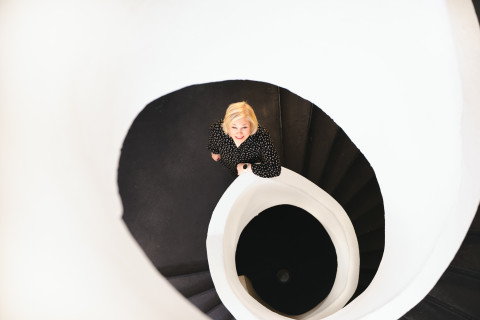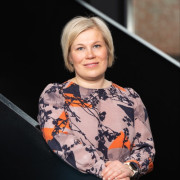Higher education institutions should find ways to support students whose earlier education didn’t properly set them up for academic success in university.
Longer-term training for university teachers to support students with various backgrounds
“It is important to understand that not all students start from the same level, and differences can be surprisingly pronounced even in university. That is why we need to pay closer attention to what and how we are teaching,” says the newly appointed Professor of University Pedagogy Heidi Hyytinen, describing the outset of her professorship.
Lately, the need for university pedagogy has been stirring public debate. Universities have always had students with various backgrounds in them, but as the number of people with higher education grows, so does the need for support. And to support students in the right way, teachers’ skills and university pedagogy need to be developed.
The University of Eastern Finland is currently investing in university pedagogy through the appointment of a professor and two university lecturers in university pedagogy, and the team comprises Hyytinen and University Lecturers Sirkku Lähdesmäki and Sanna Väisänen. One of the first initiatives will be to offer the staff a revised, 60 ETCS study module in university pedagogy.
“Studies show that pedagogical thinking and pedagogical skills won’t improve simply by teaching in a university for a long time; instead, training is needed,” Hyytinen explains.
In addition to pedagogical training, the actual change and development will start from the everyday life of the university, and that is what Hyytinen is now pursuing in collaboration with others.
“In order for the development work to be effective, it must involve all parties ranging from teachers and students to leaders.”
In Finland, professorships in university pedagogy can currently be found only at the Universities of Helsinki, Turku and Jyväskylä.
“These professorships are rarely available, so I was determined to apply for this interesting role, which is a good fit for me. And of course, the University of Eastern Finland’s reputation as a good employer didn’t hurt, either,” Hyytinen says, smiling.
Teachers provide support in educational transitions
The upcoming 60 ECTS study module in university pedagogy is currently on the drawing board. However, it is clear that the studies will develop teachers’ competencies comprehensively and in a research-based manner.
“On one hand, the study module must be current and relevant, while on the other hand it also needs to ensure that everyone completing it gets the necessary pedagogical skills and knowledge for their own professional development and, more broadly, for the development of education in their discipline.”
The key goal of university pedagogy is to ensure high-quality and good teaching, which leads to high-quality learning and, ultimately, to successfully completed degrees. Particular attention must be paid to how the learning outcomes defined in the curriculum can be achieved so that students acquire the knowledge and skills they need in the labour market and in our changing world.
Pedagogical thinking and pedagogical skills won’t improve simply by teaching in a university for a long time; instead, training is needed.
Heidi Hyytinen
Professor of University Pedagogy
Skills in critical thinking instead of unreflective thinking
In recent years, Hyytinen’s research has been focused on students’ educational transitions.
“My research suggests that higher education institutions should find ways to support students whose earlier education didn’t properly set them up for academic success in university. Research shows that different starting points are reflected, for example, in how students engage with their studies and how they progress.”
Hyytinen has explored students’ self-regulation of learning as well as generic skills, which include critical thinking and argumentation skills.
“My research focuses not only on generic skills, but also on the tools used to assess them. My research provides new insight into what kind of generic skills students have when entering higher education, and how these skills develop during their studies.”
Generic skills are essential for students to acquire the knowledge and skills of their discipline. However, research shows that there are significant differences between students.
“Universities should provide students with opportunities for challenging their ideas and for independent thinking. Yet, some students still view studying as reproducing of information. That should not be the purpose of university education.”
According to Hyytinen, curricula should be developed in a direction that offers students genuine opportunities to practice, reflect and receive feedback on the key generic skills of their discipline alongside discipline-specific knowledge – and this should be systematic throughout the entire study path.
Teachers, too, need support and pedagogical training to provide this teaching and guidance, and this is what the new study module now seeks to respond to.
From optics to education
Heidi Hyytinen is a trained optometrist. According to her, her earlier studies in optometry are a major reason why she’s now an expert in pedagogy.
“When I studied optometry, the goals of the studies and individual courses were extremely vague. That gave me the impetus to explore how to improve teaching.”
Hyytinen ended up studying adult education, leaving behind her work as an optometrist. Still, she is happy with her previous career.
“It wasn’t a bad detour at all. On the contrary, I believe the customer service skills I learnt are very valuable in my current role as well. In addition, when I was studying educational sciences, I already had a child of my own and some work experience too, so that gave me some perspective on my studies.”
In her free time, Hyytinen enjoys spending time at her cottage in an allotment garden, from where she also works in the summer.
“It is a paradise on earth for me. When I take care of my flowers and garden, everything else fades away.”
Hyytinen’s children have already flown from the nest and are studying elsewhere, her son in Oulu and her daughter in the United States. At home, however, the family’s chihuahua Choko requires care and attention.
“I just moved to a slightly smaller apartment with my spouse, so our home will remain in southern Finland also in the future. But I try to spend plenty of time here in eastern Finland as well.”
HEIDI HYYTINEN
- Professor, Education, University Pedagogy 1 January 2024–
- PhD, University of Helsinki, 2015
- MA, University of Helsinki, 2010
- BA in Optometry, Oulu University of Applied Sciences, 2001
- Title of Docent in University Pedagogy, University of Helsinki 2020
Key roles
- University Lecturer in University Pedagogy, University of Helsinki, 1 Oct 2017–31 Dec 2023
- Postdoctoral Researcher, University of Helsinki, 1 Jan 2016–30 Sept 2017
- University Lecturer (temp.), University of Helsinki, 1 Jul 2015–31 Dec 2015
- Doctoral Researcher, University of Helsinki, 1 Jan 2013–30 June 2015
- Project Researcher in the Assessment of Higher Education Students’ Learning Outcomes project, AHELO, University of Helsinki, 1 Feb 2010−31 Dec 2012
- Optometrist, Tähti Optikko, 2002–2008
Print-quality photos: https://mediabank.uef.fi/A/UEF+Media+Bank/62775?encoding=UTF-8 ja https://mediabank.uef.fi/A/UEF+Media+Bank/62774?encoding=UTF-8


